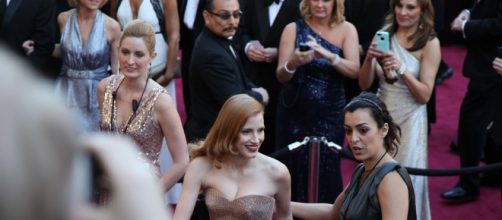As the #Oscars race gears up today for the awards presentation, many in the industry are praising the academy for including plenty of black nominees in this year's ballot. This, after complaints soared far and wide in 2016 about the lack of racially diverse contenders.
The hashtag #OscarsSoBlack spread like fire on social media last March, creating a huge amount of awareness facing the difficulties of multi-ethnic filmmakers and actors.
The fruits of this awareness were evident in the last few weeks. #Moonlight, Barry Jenkin's empathetic indie film with its all black cast, scooped up a handful of awards at the Independent Spirit Awards a few days ago.
Many of the black actresses and actors in films such as Fences and Hidden Figures have also been gaining a lot of media coverage.
But this year there is another huge issue in representation. This year the noticeable exception in the Oscars race is #women. Only 20 percent of the nominees outside of acting are women. And some in the industry are furious.
The Hollywood Reporter examines the men-only issue
In an article in the #Hollywood Reporter last week, Lynda Obst wrote about how the industry is rigged for young white dudes. She says that whilst the film industry is the best business for women and the marginalized – due to the industry's reactive nature and its plethora of easily shamed people – she bemoaned the lack of opportunities for women on a day-to-day basis.
The #ACLU discrimination lawsuit was a valid threat, and one would think it would have led to more female contenders in the directing chair. But this isn't the case. Sure, agents are now sure to include female directors in their lists, and there has been a lot of noise on social media. But the numbers and figures on the amount of females being hired to direct feature films are disheartening. And it's time, many think, for a shake up.
Obst claims that scores of young white men get hired to studio tentpole movies only after one VFX job (in the case of Godzilla). Or art direction – as is the case for the director of Maleficent. Or just one short film – as evidence by the director of the Maze Runner.
Nobody, Obst claims, is in any way "extreme vetting" to ensure that women aren't being disadvantaged by white, male privilege. The problem is, candidates, she explains, get put in the rejection pile for one of three reasons. Either they've never made a feature. Or they have had one flop. Or just one person who they have worked with calls them difficult. It's easy to use their qualifiers to disadvantage women, who find it harder to get the opportunity to direct their first feature, and who face that same white, male privilege every move they make. Also, she says, women aren't ever considered for those massive tentpole movies that always seem to go straight to young, white men.
Romantic comedies used to be the way to go
Once upon a time, women would have found their way into film making success through the romantic comedy – but that genre died in the late nineties, early 2000's; either that or the genre has been usurped by men such as #Judd Apatow and Seth Rogen. Rom coms these days are not the rosy, upbeat, comedic vehicles they once more. Producers only want to fund – at the medium budget level – rom coms that have a twist or a conceptual premise. Or a male star.
All the talented female writers went to #TV, where they started to EP and showrun, but they aren't crossing back into greenlight success in the movie industry. Why? Because it's an industry run by old white dudes for young white dudes. And something needs to change.

